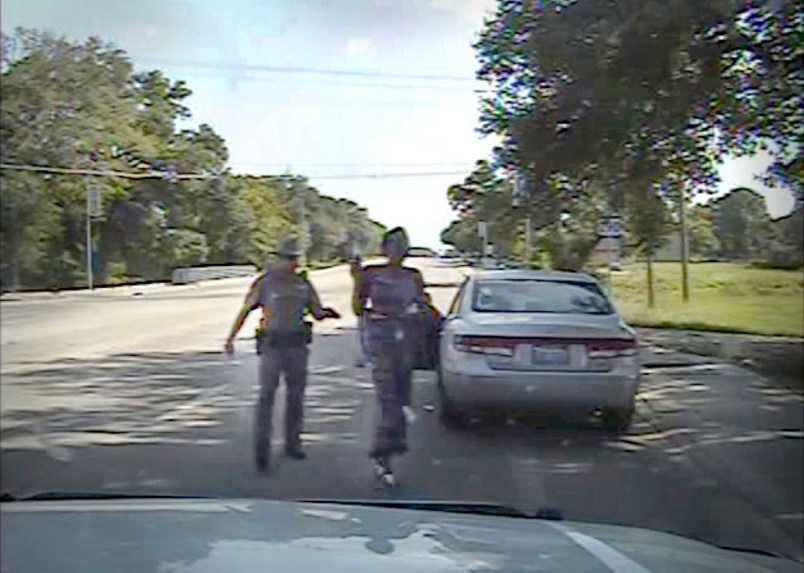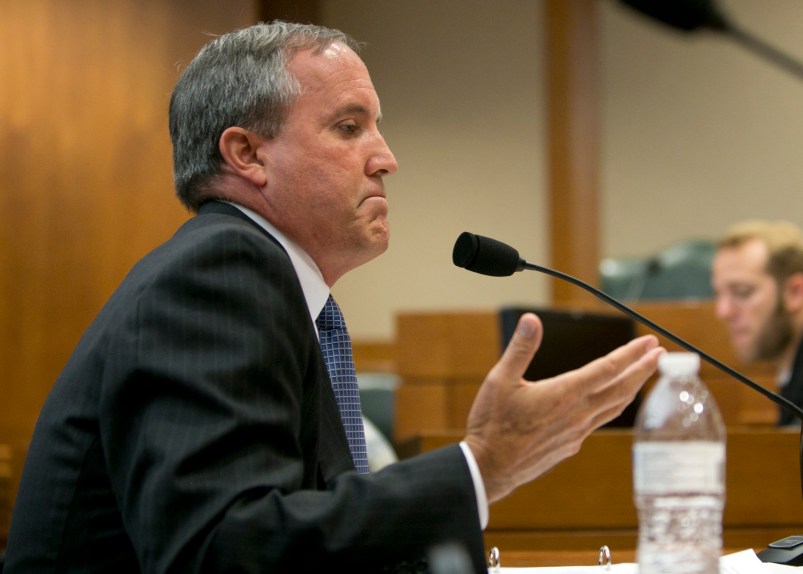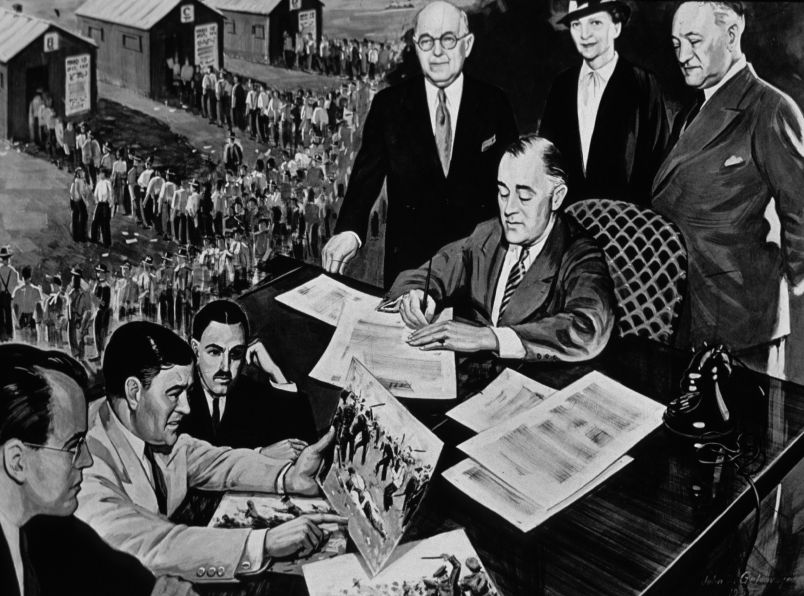As the video of Sandra Bland’s arrest makes its way into homes and offices around the country, people are aghast that the failure to use a turn signal led to a woman’s arrest and, ultimately, her death by what officials have identified as suicide. People want to know if the officer’s actions—asking that Bland put out her cigarette and demanding that she step out of her car—were legal. But that’s the wrong question. Instead, we should be asking whether it was good policing.
As a former police officer, and now as a legal scholar who studies policing, I know the law is not a moral compass. An officer’s actions can be entirely lawful, and yet fail to meet the high standards that we should expect from our law enforcement professionals, our community guardians. When we focus on whether the police acted lawfully, we are missing the chance to ask whether they acted appropriately. As I watch the dash camera video of the traffic stop, I can’t help but think of the distinction between lawful policing and rightful policing.
Here’s what we see in the video: After issuing a warning ticket in an earlier traffic stop, Trooper Brian Encinia is driving through an intersection to within several car lengths of a vehicle in front of him, Sandra Bland’s car. Seconds later, Bland changes from the left lane to the right lane, but she does so without signaling. Within ten seconds, Encinia pulls behind her and activates his overhead lights (this is when the audio recording comes online, which happens automatically when the lights are activated). About 20 seconds after the lane change, Bland has pulled over.
The initial portion of the traffic stop is entirely unremarkable. Encinia walks up to the passenger-side window—not an unusual approach—and identifies the reason for the stop before asking for Bland’s driver’s license and insurance. He asks her a few questions—how long she has been in Texas (“Got here yesterday”) and where she’s headed (“Work”). He asks Bland for her driver’s license a second time. Although neither Encinia nor Bland sound happy, both are polite. He calls her “ma’am.” She answers his questions and apologizes for not providing her driver’s license, which she thought she had already handed him. He says, “Give me a few minutes, alright?” before walking back to his car.
Almost five minutes later, Encinia walks up to the driver’s side of Bland’s car carrying a ticket book. Almost immediately, he sees something that makes him ask, “You okay?” When Bland tells him that she’s waiting on him, he replies, “You seem very irritated.” She is, and she explains why: She switched lanes because she saw him accelerating behind her and wanted to let him pass. “So, yeah, I am a little irritated,” she says. “But that doesn’t stop you from giving me a ticket.”
It is right here that Encinia has an opportunity to alleviate some of the tension of the encounter. He could, for example, thank her for moving out of the way, but explain how important signaling is, especially near an intersection. He could let her know that he has written her a warning, not a ticket (a fact that does not become clear until much later in the encounter). He could try to connect with her on a personal level, perhaps by telling her that he’d hate to welcome her to Texas with a traffic ticket.
In short, he has a chance to engage with Bland in a way that reduces antagonism and builds goodwill. It isn’t hard, and can be summed up in three words: Receive, respect, respond. Receive what someone is telling you, respect their position, and respond appropriately.
But he doesn’t. Instead, Encinia is silent. A couple of seconds pass. Then he says, “Are you done?” Those three short words send a powerful signal: “What you said does not matter.” This is the first failure in this encounter. It is not a legal failure—there is no law that requires officers to meaningfully engage with people—but it is a failure nonetheless. It is a missed opportunity for good policing.
Encinia next asks Bland to put out her cigarette. Notice that I use the word “asks.” There is a difference between a command and a request. A command is an order that the officer has legal authority to enforce. Failing to comply with a command can result in arrest or, if necessary, the use of physical force to overcome resistance. A request is altogether different; a preference that the officer would like someone to voluntarily accede to, but lacks the legal authority to require. Asking Bland to put out the cigarette she was smoking while sitting in her own car was a request, and one that she was well within her rights to decline.
When Bland refuses to put out her cigarette, Encinia orders her out of her car, saying, “Well, you can step on out now.” This was a command. In a 1977 case, Pennsylvania v. Mimms, the Supreme Court held that officers can, at their discretion, order a driver to exit the vehicle during a traffic stop (a later case expanded the rule to other vehicle occupants). That rule was justified, the Mimms Court said, because the importance of officer safety outweighs what the Court saw as the “mere inconvenience” of having to exit one’s vehicle. Although the rule is grounded in safety, officers do not need to articulate any safety concerns or any other reason in each case; they have carte blanche to require someone to exit a vehicle during the course of a traffic stop. Encinia had the authority to order Bland to exit her vehicle.
But even though it was lawful, it was not good policing. If Encinia was exercising his authority because Bland had refused to comply with his request to put out her cigarette, he was doing so to demonstrate his control over both her and the encounter itself. That is pure ego, and ego has no place in modern policing.
To be fair, I don’t know Encinia’s reasons for having Bland step out of the car. Perhaps he would have done so regardless, even if she hadn’t been smoking, although the video suggests otherwise (he did not have the driver step out during the previous stop, and he did not put his pen away and his ticket pad down until after Bland refused to put out her cigarette, indicating that he was originally planning on talking over the warning ticket while she sat in her car). Regardless, it is problematic when officers focus on compliance—expecting people they interact with to be entirely deferential—to such an extent that they neglect cooperation, which must be earned.
Imagine the potential change in the tone of the encounter if Encinia had said, “You’re right, you don’t have to, and I’m sorry to ask, but cigarette smoke sets off my asthma. Would you mind putting it out or in the ashtray, please, just while I’m talking to you?” Or if, upon hearing her refusal, he had simply acknowledged it and turned to the warning ticket. Either way, he would have been signaling to Bland that he respected her control over at least some aspects of the encounter, rather than demanding she recognize his dominance.
This is a particularly important point to keep in mind given the potential for race, gender and class dynamics to affect police encounters. We all—officer and civilian, black and white—have implicit and unconscious biases that affect the way we perceive the world and how we set our expectations. For example, officers may expect more deference from a black woman driving an older car than they do from a white attorney in an expensive D.C. neighborhood. And as a result, they may react to a lack of deference very differently.
When Encinia ordered Bland to exit her vehicle, she refused. “I don’t have to step out of my car.” Rather than handling the remainder of the stop with her sitting in the car, or explaining why he wanted her to step out of the car, or attempting to obtain her cooperation, or calmly explaining the law, Encinia simply invoked his legal authority, shouting at one point, “I gave you a lawful order.” He was right. It was lawful. And when Bland did not obey, she was refusing a lawful order, a crime under Texas law. Her arrest, like the confrontations that led up to it, may have been lawful, but it was entirely avoidable had Encinia chosen a different approach.
We all deserve more than legal policing. We deserve good policing.
Seth Stoughton is a law professor at the University of South Carolina, where he is affiliated with the Rule of Law Collaborative. He served as a police officer and investigator for more than seven years. Follow him on Twitter @PoliceLawProf.









